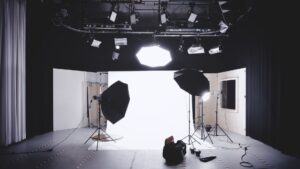 “Your hair looks fabulous.”
“Your hair looks fabulous.”
“Thank my stylist—it hasn’t been this color for a decade!”
“You look better than ever!”
“It’s all the work I’ve had done.”
“Your photos will be ready by Friday.”
“Make sure you airbrush my double chin!”
Can you imagine someone in the court of Versailles being so blunt? There, the point of high artifice was to glide through society without acknowledging it. We, on the other hand, cheerfully admit to all our “work,” which rather takes the fun out of it. Deception is no longer a game: Everyone knows that salons can freeze away fat, contacts can change your eye color, Botox can plump away those crabby slashes above your lip, and a few minutes post-production can give a plain face a glowing beauty, literally putting stars in her eyes. All of this is fine. Illusion is fine; temporary fixes are fine; outright physical lies are fine. At home with the possibilities and processes of transformation, we feel no need to pretend we wake up every morning looking this way. What matters is only the visible result: Power rests with what is seen, not with how it came to be.
A brilliant and brilliantly rude photographer once had me in her studio, her words hacking apart my self-esteem. It was mortifying jutting my head forward (“like a turtle,” she insisted) to minimize my double chin. But the photo, once “retouched” (a kinder, older word) was gorgeous, and against all logic, having seen the tricks and being painfully aware of the truth, I still felt prettier because it existed.
How ironic that it is now, when we are more skilled than ever at altering our appearance or manipulating its digital image, that we have decided seeing really is believing?
So much collided to bring us to this paradox. Technology gave us a hybrid of image, spoken word, and text that is altogether new, electric in every sense of the word. Vision is still our culture’s dominant sense, but movement and soundtrack give it far more power than Gutenberg could. Images play on the screens that conduct our jobs, our entertainment, our survival. Communication is so fast and easy, formality seems stilted; our interactions, even with strangers, are as candid as a quick selfie.
Is it also relevant, I wonder, that we live in a surveillance state? Drones fly overhead, recording our homes and activities, and airport machines see more of our innards than we can. Our psyches are also under surveillance, and therapists keep reminding us that whatever we most want to conceal is precisely what must be revealed. Decade by decade, we have grown more confessional, from the tabloid tell-all to Oprah to chatrooms filled with bared, sticky souls, all of this a reaction against the damaging secrecy of the previous generation.
And so, we tell our secrets. The openness is refreshing; it undercuts vanity, makes us all co-conspirators. But as the curtain draws back, we see how weird this theater is. We want the illusion of a beauty and youth we do not possess naturally, and we feel obliged to admit the artifice, so in the end, we are not fooling anyone, which is fine, because we are all faking it together, laughing about it but refusing to stop, because all that matters is what the camera captures or the eye’s camera perceives. “Photoshop me,” people beg, as though two dimensions counted more than three, and a single image could outweigh what the mirror says every morning.
It probably can, if the image becomes your avatar. It will be seen far more often than you will, if “you” is the living, breathing self with raccoon eyes and blotchy skin in the looking glass. Facetime or Zoom can still catch that self, but we schedule ahead so we can dress waist-up, fix the lighting, wear a little makeup, choose a fun fake backdrop.
There are days I despise this preoccupation with image, despise myself for fussing with face paint (though I am fast forgetting how) and yearn for a time without cameras. A time when portraits were made only once or twice a life, if at all, and had to be sat for, and took months to paint.
Months I probably would have spent reminding the artist to soften my double chin.
